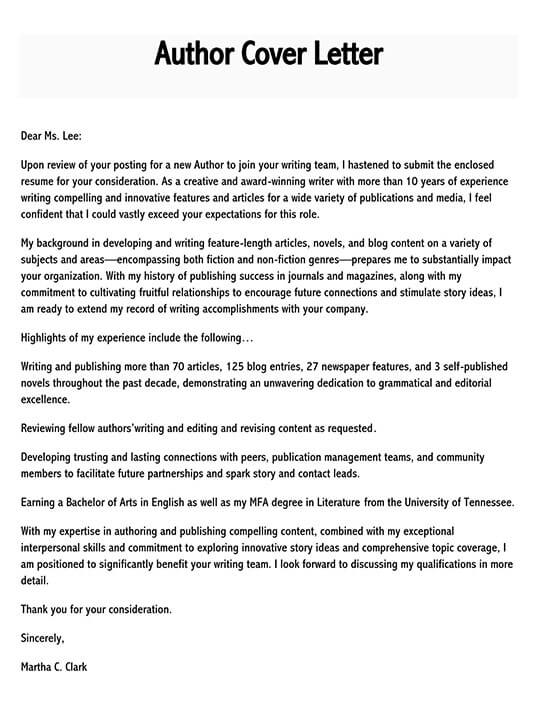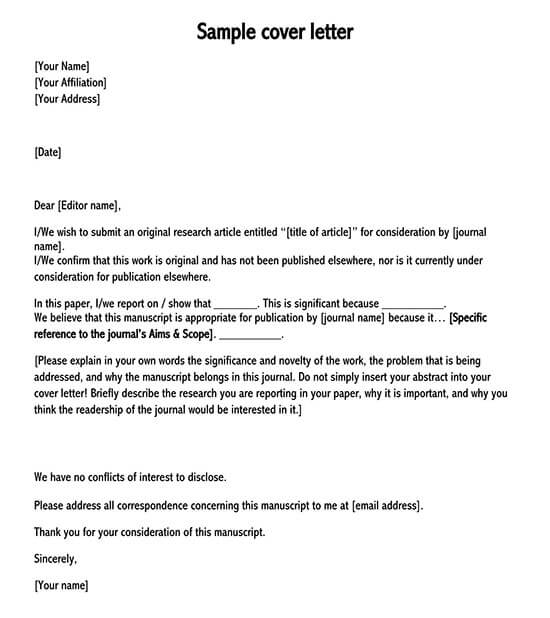The exact definition of a cover letter is: “a letter sent with, and explaining the contents of, another document or a parcel of goods.” They are typically created when applying for a job. An author’s cover letter is no different and must be submitted at the same time as the proposal for a manuscript.
Free Downloads


Important Points to Remember
If you have never written one before, don’t worry. We have written step-by-step instructions to aid you in the process:
Formatting
As an author, it is common to want to be creative, but this is one area where that is greatly unnecessary. A cover letter should be professional. To make yourself seem as professional as possible, adhere to the standard format for cover letters. Whether you are printing and sending a physical cover letter or sending it via email, it does not matter. Be sure to keep it clean, precise, and to the point. Examples of the standard format can be found anywhere with ease.
Keep it short
As with application cover letters, they should not exceed one page. In the very first paragraph, clearly explain what you are sending. This can be as straightforward as: “Kindly find enclosed a short story, ‘Choose Me, please!’ which describes a game show contestant.”
Address the editor
Many cover letters begin with a vague addressing line, such as “To whom it may concern.” This should not be the case with yours. Do an extra few minutes of research to find the editor’s given name. Even if you address the incorrect person, your cover letter will stand out more than the generic one sent by another author in competition for your manuscript’s attention.
Simplicity is key
You are not required to write twenty pages for your cover letter, let alone more than just one. Keep it simple. Write as little as possible to keep the editor interested while still providing enough insightful information. The first paragraph will be skimmed, so write it well, but keep it short.
Be honest
If you have submitted your manuscript to multiple publications, write that down. Do not withhold such vital information. If your submission is chosen by another publication before the editor is able to call you, they have wasted their precious time. Be sure that they know there is a risk of that when considering your work.
The “contributors’ notes” section
If you are unsure what the “Contributors’ Notes” section is, it pertains to the back, or the end, of the journal, where a summary of the writer is placed. You may include whatever information you want here, such as where you’ve studied, what you do now, and if you have ever published your original work before.
Your closing statement
Simply thank the editor for their time, type “Regards” or something similar, insert four spaces, and then type your name. Nothing else is needed.
You want a response
If you are physically sending your cover letter, remember to include a second envelope inside the letter for them to mail their reply. Be sure to include the stamp on this second envelope, so their postage will be free, as is common courtesy.
Keep track of your submissions
If you are submitting your manuscript to multiple publications, you will want to keep track of each one. That way, when your submission is accepted by one of them, you can send the other publications a polite withdrawal.
Do your research
Google is your best friend and ally. Research examples of other cover letters authors have submitted. Or cover letters businesses have praised and caused the senders to be accepted nearly immediately to the position they were applying for. Sometimes visualization is the best preparation.
Read the submission guidelines carefully. Many publications normally state in their guidelines the precise details that must be included in a cover letter. With some minor variations, a general rule of thumb is to include:
- The Editor’s name (if you can locate it)
- Title
- Word count
- A summary of your piece
- Genre/Category
- State if you have published previously
- Your name
- Whether your piece is a simultaneous submission, i.e., if you will be sending the same piece to several literary journals or magazines at the same time.
Template Author Cover Letter
[Your Full Name]
[Your Address]
[City, State, Zip Code]
[Your Email Address]
[Your Phone Number]
[Date]
[Recipient’s Full Name or Editor’s Name]
[Title, if known, e.g., Editor, Literary Agent]
[Publishing House or Magazine Name]
[Company Address]
[City, State, Zip Code]
Dear [Recipient’s Last Name or “Editor”],
I am writing to submit my [type of work, e.g., manuscript, article, collection of poems] titled “[Title of Your Work],” for your consideration. As an author with a deep passion for [briefly describe the genre or subject matter, e.g., contemporary fiction, historical research, environmental issues], I believe that my work aligns well with [mention the publication, agency, or publisher’s focus or previous works if applicable].
“[Title of Your Work]” is a [brief description of your work, focusing on its themes, premise, or unique aspects]. [If applicable, mention any previous publications, awards, or recognitions related to your writing]. My intention with this piece is to [briefly state your goals or what you hope to achieve with your work, e.g., shed light on a particular issue, entertain readers with a compelling narrative, contribute to the discourse on a specific topic].
I have chosen to submit to [Publishing House, Magazine, or Agent’s Name] because [mention why you think your work is a good fit for them, referencing their published works, editorial stance, or market position]. I am impressed by your commitment to [mention any relevant themes, genres, or values they uphold], and I am enthusiastic about the opportunity to contribute to your esteemed [publication, list, roster].
Enclosed, please find [mention the documents you’re including, e.g., the full manuscript, a synopsis, the first three chapters, an outline]. I am [mention if the work is complete or in progress, and any other submission details they should be aware of]. [If submitting to literary agents or publishers, you might also mention if the manuscript is simultaneously being submitted elsewhere].
Thank you for considering my submission. I am looking forward to the possibility of working with [Publishing House, Magazine, or Agent’s Name] and am eager to hear your thoughts on “[Title of Your Work].” I am available at your convenience for any follow-up discussions or to provide further information. Please do not hesitate to contact me at [Your Phone Number] or via email at [Your Email Address].
Warmest regards,
[Your Full Name]
Samples of Author Cover Letters
Sample 01 Cover Letter for a Manuscript for an Academic Publication
Dear Dr. Johnson,
I hope this letter finds you well. I am writing to submit my research article titled “Impact of Urbanization on Coastal Ecosystems: A Comparative Study” for consideration for publication in the Journal of Advanced Environmental Studies. My co-authors and I believe that our findings significantly contribute to the field of environmental science, particularly in understanding the nuanced effects of urban development on coastal biodiversity and ecosystem services.
Our study employs a novel methodology combining remote sensing, field observations, and statistical modeling to assess the impact of urban expansion on three distinct coastal regions over the past decade. The results not only highlight the vulnerability of coastal ecosystems to urban pressures but also propose actionable strategies for sustainable urban planning and conservation efforts. Given the journal’s dedication to publishing cutting-edge research on environmental challenges and solutions, we are confident that our article aligns well with the interests and goals of your readership.
The Journal of Advanced Environmental Studies is renowned for its rigorous peer review process and its commitment to advancing knowledge in environmental science. It would be an honor to have our work featured in your esteemed journal, contributing to the global dialogue on sustainable development and environmental protection.
Please find attached our manuscript, along with the names and contact information of three potential peer reviewers who have expertise in urban ecology and conservation science. We have ensured that the manuscript adheres to the journal’s submission guidelines and formatting requirements. The study has not been published elsewhere, nor is it under consideration by any other publication.
We appreciate your consideration of our work for publication in the Journal of Advanced Environmental Studies. We believe that our findings will be of interest to your readers and will spark further research and discussion in the field. I am available to provide any additional information or clarification you may require and I look forward to the opportunity to contribute to your journal.
Thank you for your time and consideration.
Sincerely,
Dr. Alex Rivera
Department of Environmental Science
University of Green Earth
alex.rivera@uge.edu
(555) 987-6543
Sample 02 Cover Letter to Acquisitions Editor
Dear Ms. Quinn,
I hope this letter finds you well. My name is Jordan Lee, and I am thrilled to submit my manuscript, titled “Whispers of the Forgotten,” for your consideration at Dreamscape Publishing House. As an avid reader of several titles in your catalog, particularly those in the realm of speculative fiction, I am inspired by Dreamscape’s commitment to bringing imaginative and thought-provoking stories to life. I believe my novel aligns with your mission and would resonate well with your audience.
“Whispers of the Forgotten” is a 90,000-word speculative fiction novel that weaves together elements of mystery, historical intrigue, and magical realism. Set against the backdrop of a world where history’s forgotten figures are resurrected through the power of memory, the story follows Elara, a young historian, who discovers she possesses the ability to bring back these lost souls. As she delves deeper into her powers, she uncovers a centuries-old secret society determined to control history’s narrative. Elara’s journey is not just one of self-discovery but also a reflection on the importance of remembering those who have shaped our past.
This novel is the product of my passion for history and fantasy, combined with a deep-seated belief in the power of stories to challenge, entertain, and inspire. “Whispers of the Forgotten” aims to engage readers with its richly crafted world, complex characters, and themes of memory, identity, and the impact of the past on our present.
Dreamscape Publishing House’s dedication to publishing distinctive and compelling narratives is why I am excited about the prospect of working together. I am particularly drawn to your success in nurturing debut authors and your innovative approach to storytelling, which I believe would provide the perfect home for my novel.
Enclosed with this letter, you will find the first three chapters of “Whispers of the Forgotten,” along with a synopsis of the novel. The complete manuscript is available upon request. I am eager for the opportunity to discuss the potential of my novel with you further and am open to any feedback or suggestions you may have.
Thank you for considering my submission. I am looking forward to the possibility of contributing to the esteemed collection of works published by Dreamscape Publishing House. Please feel free to contact me at (555) 123-4567 or via email at jordan.lee@novelauthor.com.
Warmest regards,
Jordan Lee
Analysis
The first sample is an exemplary cover letter for a manuscript submission to an academic journal, effectively communicating the significance and relevance of the research article. It clearly outlines the study’s contribution to the field, employing a structured approach that highlights the novel methodology and the implications of the findings for sustainable urban planning. By directly aligning the article with the journal’s focus and expressing respect for its peer-review process, the letter demonstrates an understanding of the publication’s objectives and audience. Additionally, the inclusion of potential peer reviewers adds to the professionalism of the submission, showing readiness to engage with the journal’s review process.
The second sample presents a compelling cover letter to an acquisitions editor at a publishing house, showcasing a manuscript for publication. It immediately grabs attention by expressing admiration for the publishing house and stating how the manuscript aligns with its catalog. The detailed description of the novel blends plot summary with thematic elements, aiming to intrigue the editor about its unique aspects and potential appeal to readers. The author’s personal connection to the story’s themes and their acknowledgment of the publisher’s role in supporting debut authors underscore the letter’s persuasive and personalized nature. Both letters are effective in their contexts, articulately presenting their cases to capture the recipient’s interest and consideration.












